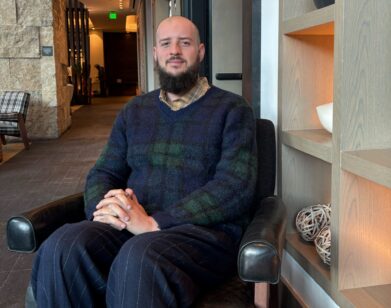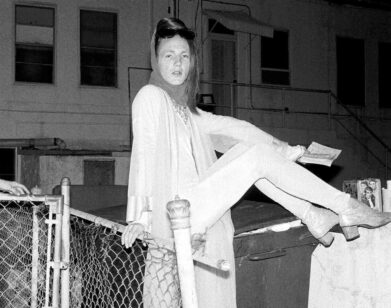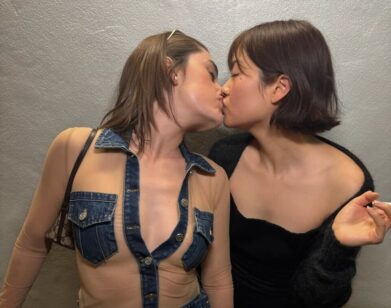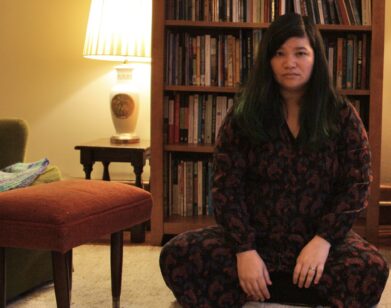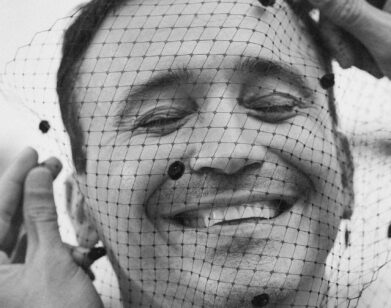Fred Armisen’s Portland Life
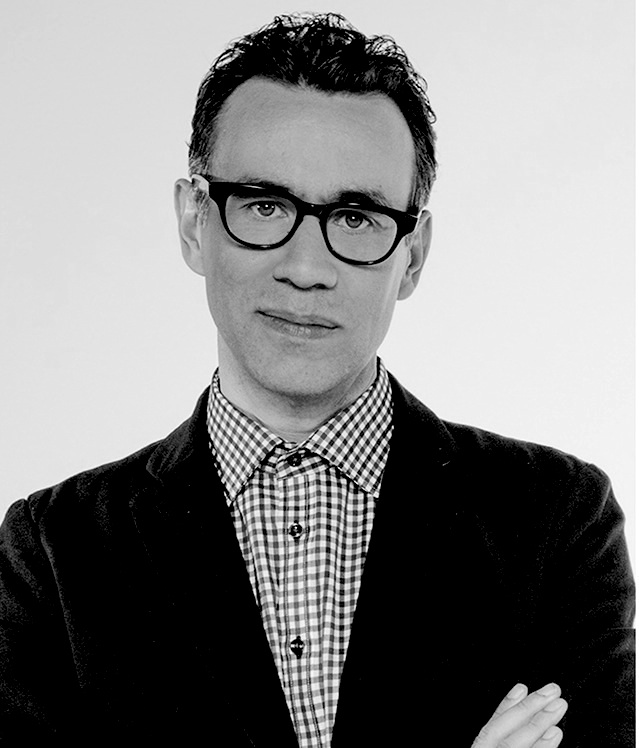
FRED ARMISEN, PHOTO COURTESY OF IFC
Portlandia, the sketch comedy show from former Sleater-Kinney and Wild Flag guitarist Carrie Brownstein and SNL funnyman Fred Armisen, has, over the past few years, developed into one of the most-talked about secrets on television. It’s succeeded in creating a language that simultaneously dissects the absurdities of the modern left-leaning set—chin-bearded cyclists, feminist bookstore proprietors, organic produce zealots, musicians with asymmetrical haircuts, wayward crust punks—all the while crafting a rosy-tinted tribute to its liberal-minded home city, a city that happens to have David Lynch alum Kyle MacLachlan as its fictional mayor.
The fourth season, which premieres tonight on IFC, expands on Portlandia‘s signature brand of comic relief, given life by Armisen and Brownstein’s deftly-played uncanny impersonations. Interview caught up with Armisen, now the recently anointed bandleader of Late Night with Seth Meyers, by phone when he was in New York.
COLLEEN KELSEY: I’m excited to talk about the new season of Portlandia—I think it’s pretty amazing that you guys have achieved a certain longevity and are coming back for a fourth season. What has changed the most in how you’ve approached the show since it began?
FRED ARMISEN: We’re psyched beyond belief. You know, every year, we always think like, “Oh, I hope we get to do more!” And more and more people will say something to me on the street and it gets a good enough reaction that we can keep going so we never take it for granted. We’re like, “Whoa. More? Great!” In the first season, we were in a dark forest with flashlights. Now what we like to do, and what we think we can do well, we can see a little more clearly. I don’t mean it as a big pat on the back for ourselves, I mean it as, we know what not to do that will end up on the cutting room floor. Our writing days and our shooting days are very to the point. We all had this really sort of prolific writing period, where everyone was at their best just writing all these sketches and putting endings on them and coming up with different angles on it. We worked really hard this year, but also we had a lot of fun. I really loved it. I loved this season, a lot.
KELSEY: What’s your writing process like with Carrie and [fellow writer and creator] Jonathan [Krisel]?
ARMISEN: It’s really weird because all we can do is just literally put up little notecards on a bulletin board and say, “What do you think of this idea? What do think of this idea? Can this be that?” So it’s just like this ever-changing map of what the year’s going to be. And then so many things come into play, too, like we’ll have an idea and then all of a sudden—recently we’ve been doing this—going online and to make sure that no one else has done it. So we’ve put up cards and then all of a sudden, whoop, CollegeHumor did it! So we take a step back, which is better than if we’d already shot it.
KELSEY: How active are you guys in researching possible bits or trends that you know are timely and fit within the Portlandia universe?
ARMISEN: We try not to research too much so that it doesn’t feel researched, so that it doesn’t feel too much like an excursion. Or like a documentary. We tried to make it really human, so it’ll be like an experience that one of us has had, like on the train or traveling or something. We just try to keep it there and then somehow stuff will trickle in. Like one of the producers will send in an article from The New York Times about something that we just wrote about—so we’re like, “Oh, good, okay. We’re on track.”
KELSEY: I read about the idea of “human bandwidth” that is threaded throughout this season—could you speak about that a bit?
ARMISEN: That’s kind of like, the initial seed—ugh, I don’t want to use that word. The initial acorn?
KELSEY: [laughs] Sure—acorn works.
ARMISEN: [laughs] Jonathan Krisel—he was at an airport—and there was a guy sitting, I think maybe on the floor, talking on his phone and on his laptop and he was yelling at someone, “I’ve reached my human bandwidth! I cannot entertain what you are asking me to do!” Sort of telling someone, “Stop, I can’t continue with this.” It’s not about too much stuff, it’s about setting your own limits, and being able to tell someone “This is all I can do.” When I put my phone away, and I’m in a situation where I can’t get to it, when I come back to my phone, it’s not like there’s anything that pressing. It’s not a criticism, because I don’t mind that we all have little computers. I think it’s a totally fine thing. The whole season, it’s more than that, though. There’s a lot about getting away—there’s a whole episode that we have about the idea of getting away. You know, when people are like, “Oh I have a house up in the country or upstate?” That “thing.” whatever that is, it’s all a part of our lives.
KELSEY: One of the things that I think makes a certain kind of comedy work and makes Portlandia work, is this kind of absurdist appraisal of really banal details of life, whether it’s David and Kath looking for a parking spot or the sketch with Doug and Claire opening a joint bank account, or whatever, contextualized within the Portlandia world. I feel like a lot of people see it as a show that talks about a certain kind of in-the-know, lefty, liberal-minded, hip kind of lifestyle, but it has a lot of universal humor.
ARMISEN: It’s all sort of a reflection of what we do anyway. And it was that way even from the beginning, but even for this season, I find myself doing all those things that we do as characters in the sketches—the parking spot thing, just all of it. It’s very much part of my life. Yeah, some people see the sort of political aspects of it, but it’s a little more universal than that.
KELSEY: There’s an extreme, caricature element to who these people are, obviously, but how much of yourself do you relate to these characters?
ARMISEN: Very much so, because even though they look kind of different than us, there are aspects of them that come out very easily. It’s kind of surprising when that comes out, but, we don’t talk that differently than the characters, really. I suppose Peter and Nance, you know the sort of syrupy couple… I don’t know how much I’m like Peter. Oh my god, I’m talking—it’s so pretentious to talk about your character! But I don’t know if I’m usually so as easygoing.
KELSEY: Do you have a favorite character to play?
ARMISEN: Yeah. There’s this one, Gavin, who has a recording studio. That one’s my favorite. It’s based on a guy I know named Woody who has a recording studio in Los Angeles and I just like the whole idea that he’s a recording studio guy.
KELSEY: And I’m sure you must find the wardrobe to be quite transformative.
ARMISEN: Oh, yeah. There are times where, because write so many sketches, we don’t know what the character is. So we just tell wardrobe, “Look, we don’t know what this is, and can you just put something together for it?” And then they find something and then we go, “Oh that’s who it is! Greeeat.”
KELSEY: I can only imagine what some of those wardrobe exchanges must be like. Like, what is the creative process of getting the perfect crust punk outfit with a rabbit accessory?
ARMISEN: That’s like Christmas because we write it out, you know, we try to describe it to them, like, “Hey, you know those crusty punks, those people the travelers, you know?” And then we describe it and we come here to prep, “You know they’ve got dreads.” And then show up with what it is and I’m like, “What!” And there’s things that I notice, you know, sometimes crusty punks have little studs in their jeans and I’m like, “Oh, yes, I didn’t notice that! Exactly.” And then like backpacks and pants and stuff hanging.
KELSEY: I’m also kind of curious—how often, out of the year, are you in Portland, because you’re mostly based in New York, right?
ARMISEN: I’m in L.A. I just got a place in L.A. and I’m a little all over the place, but Portland is a good six months. I spend half my year there because we write in about six months.
KELSEY: Do you have a gauge of how much native Portlanders are either enthusiastic or appreciative of the show?
ARMISEN: They’re nothing but nice to me. They’re like supremely nice. They’re nice to begin with. I mean, we try to make it a really complimentary show to the city.
KELSEY: So there’s no people who say, “You’re giving my Tevas and my subculture a bad rap,” or something?
ARMISEN: Not to my face. [chuckles] And if they did say that, I’d say, “Sorry.”
KELSEY: Well, I think it’s all in good fun, and in a warm-hearted way.
ARMISEN: Yeah, we try to make it that way. And it’s not for like a moral higher ground, it’s simply that it’s what works best.
KELSEY: I also wanted to ask you a little bit about the guest stars, because there are so many really great and unexpected choices, from Kirsten Dunst to St. Vincent to Steve Buscemi—and Kyle MacLachlan, I haven’t seen him in any of the new episodes yet, but now he’s kind of like the unofficial ambassador to the Pacific Northwest, which is kind of nice. Do you guys write specifically for a certain person who shows interest or do you try to recruit that you had in mind for something?
ARMISEN: Well some of the people that you just talked about, we do write for them. ‘Cause we know how great they are. The mayor’s really fun ’cause he’s had to be a sort of compass in a way. Steve Buscemi—that was like a dream come true. We wrote “The Celery Incident” and we thought, “Oh my god, Steve Buscemi would be so perfect.” So we sort of wrote it hoping that he would be able to do it, and then he was. Jeff Goldblum, as well. He’s a master at being “that guy.”
KELSEY: Is there someone that you really want on the show that you haven’t snagged yet?
ARMISEN: There’s two people I want on the show: Cindy Sherman—she’s a real hero of mine—and Yoko Ono.
THE FOURTH SEASON OF PORTLANDIA PREMIERES TONIGHT AT 10 PM EST/9 PM CST ON IFC

